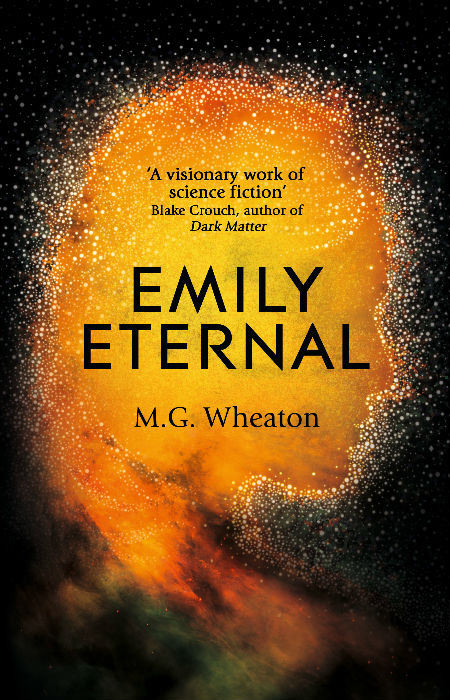
If you’re convinced that Terminator‘s Skynet and the dire warnings of Elon Musk are all there is to be the coming AI revolution, then reading M. G. Wheaton’s Emily Eternal may play a pivotal role in changing your mind.
Or, at least, easing your fears a little (after stoking them a little, of course).
A rip-roaring apocalypse-is-nigh thriller with an exploration of humanity at its beating heart core, Emily Eternal refreshingly adopts the position that while AI may be a bit touch and go, that Artificial Conciousness aka Emily is a whole other, very touchy feely thing altogether.
Or at least that’s how Emily likes to see herself.
The creation of Dr Nathan Wyman, star professor at the Massachusetts Institute of Technology, Emily is a marvel – an artificial consciousness who, though birthed in the sterile environs of a lab, is designed to help people process all kinds of trauma by going deep into their subconscious, with their permission of course, to find out what really ails them, and then talking about it.
She’s an amazing invention – all 0s and 1s in a sense but almost wholly human in another who exists in a real-life, 15-second delayed simulation where she sleeps, eats, dresses, walks across campus and interacts with Nathan and his team like she’s just another person.
“That difference is everything. Humans are, each one of them, an evolutionary miracle. Even one of them is ten times more complex than I’ll ever be. I am merely the product, the hard work, of an imaginative and educated few. Hard work that will never become one of them, try as she might.” (P. 83)
And, in every respect that matters, she is, empathetic, caring, worried about her appearance and seeing only the best in the flawed glory that is the homo sapiens species, even though, because of her vocation, she is well aware of and deals with the worst.
Emily, the very archetype of what it means to be human (and virtuosically-created by Wheaton as an engaging, heartfelt and thoughtful character), is the epitome of what makes humanity good (when it isn’t being monstrously bad, of course).
Too bad, humanity is doomed.
Yep, just as we’ve reached the point where something as wondrous and life-affirming as Emily is possible, the sun decides to start dying 5 billion years early in a doomsday scenario known as the Helios Event, meaning humanity has got but months before it, and all other life, is boiled off the face of the planet.
It’s an apocalyptic scenario that Wheaton deftly uses, and with real empathy and insight, to explore what people will give up in order to survive, and whether our innate humanity, the very thing that makes us different from all other life and which Emily loves and appreciates (though not blindly; she’s no naive babe in the woods), is one of the things that makes it onto the existential life raft.

Part of a growing genre of apocalyptic books that focus on the humanity of the situation and not the imminent death and downfall of civilisation – thought that is not, and cannot, be ignored, especially given what it unleashes in Emily’s hitherto sealed-off world – Emily Eternal beautifully brings together the death knells of humanity, Emily’s upholding and no-holds-barred defence of said humanity and the kind of desperate violence that results when the unthinking, or rather differently thinking, try to set the agenda at the end of the world by their own brutalist means.
Throughout the rough and tumble of the narrative which actually features an attack on Emily’s campus high in body count and destructive capability, Wheaton never loses sight of the fact that while there is action aplenty, and grippingly-immersive action at that, Emily, and newfound friends, college student Jason, on whom she has more than an algorithmically-programmed crush, and small town gungho sheriff Mayra, are on a quest to save what really makes us worth saving.
Her enemies are pursuing a salvation strategy that ignores what makes humanity so intrinsically worthwhile, and while it’s many deficiencies are not ignored, and its great many flaws duly acknowledged, through Emily we have an advocate who understands and works tirelessly to save the very thing that though who oppose her would snuff it, even as they ostensibly save the species.
“For efficiency’s sake, Emily-2 is right. It’s better this way. But as we wait for our turn to life off, I can’t help thinking—if this is what Emily-2 thinks of the species’ worth, why save it at all? Why not just blast into space on your own?
I wonder if that idea crosses her mind. It must. So, what keeps her back? She couldn’t be questioning her own connection to humanity, could she? Does it come from fear?” (P. 260)
Wheaton succeeds in making a brilliant, affecting advocate because while Emily is aware of the flaws, she is also aware of the good things that are worth saving and celebrating such as free will, compassion, fighting for right over wrong, caring unreservedly for love and fighting on even when all hope seems lost.
As banner people go for a species, Emily is pretty much the pick of the crop, and while you could bemoan the fact that she’s come along just when humanity is about to have no need of her services (not so fast people! Wait and see … wait and see …), it becomes apparent, and reasonably quickly too, that Emily is just where she needs to be when she needs to be there.
If you want an apocalyptic action thriller with head and heart firmly in place, Emily Eternal is your book, a gripping story that understands that nothing is ever simple when it comes to humanity, even its over-early demise, and that simplistic ill-thought out solutions can’t ever win against more considered options that understand all too well, as Emily does, that there’s no point “saving” humanity if that involves destroying everything unique and wonderful about it.
As eyes-well-open love letters to humanity go, it’s hard to beat Emily Eternal‘s captivating mix of action, heart and philosophical intent, told in the kind of way that has you on the edge of your seat, heart in mouth and appreciating that though we may have our issues, there’s a lot about us worth hanging onto.
Just ask Emily.